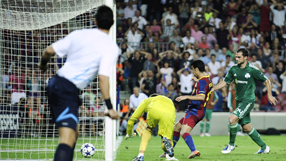
The best features, fun and footballing quizzes, straight to your inbox every week.
You are now subscribed
Your newsletter sign-up was successful
Want to add more newsletters?

Five times a week
FourFourTwo Daily
Fantastic football content straight to your inbox! From the latest transfer news, quizzes, videos, features and interviews with the biggest names in the game, plus lots more.

Once a week
...And it’s LIVE!
Sign up to our FREE live football newsletter, tracking all of the biggest games available to watch on the device of your choice. Never miss a kick-off!
Join the club
Get full access to premium articles, exclusive features and a growing list of member rewards.
A year after goal-line technology was rejected by the International Football Association Board (IFAB), the item is back on the agenda following tests carried out at FIFA's headquarters in Zurich under the auspices of the Swiss-based technology research institute EMPA.
Although all 10 systems trialed failed FIFA's stringent tests last month, there has been a notable shift in the board's attitude towards using a hi-tech system.
The issue was resurrected by FIFA president Sepp Blatter when England were denied a goal against Germany in last year's World Cup finals when a shot from Frank Lampard clearly crossed the line.
IFAB, which consists of four officials from England, Scotland, Wales and Northern Ireland plus four from FIFA representing the other 204 member nations, is the ultimate guardian of the laws of the game and is famously conservative body.
Any new proposal needs six votes to pass into law and in the past the Northern Ireland and Wales FAs have joined FIFA in opposing the official introduction of goal-line technology.
Sources close to world football's governing body told Reuters all 10 companies which took part in the trials failed to meet FIFA's criteria, but that does not mean experiments will cease as FIFA is now willing to embrace a system if it can deliver a verdict to the referee within one second.
"The results of the tests will be considered by the International Board meeting in Wales and it will decide," a FIFA spokesman said.
The best features, fun and footballing quizzes, straight to your inbox every week.
NEXT STEP
IFAB will now decide on the next step and if experiments do continue there will be more discussions over commercial use and what competitions would be eligible.
While the debate about goal-line technology is again the main item on the agenda, IFAB is also considering other proposals and is likely to allow UEFA to continue with its five-man match official system at next year's European Championship in Poland and Ukraine.
UEFA president Michel Platini, a staunch opponent of goal-line technology but the principal advocate of having extra officials behind the goal-line, is expected to be at the meeting at Celtic Manor near Newport, Wales to argue the case.
Other proposed law-changes relate to objects on the field, including extra balls and animals, players wearing snoods and coloured tights plus referees using "vanishing spray" to mark where defensive walls stand.
There have been two well-publicised incidents recently of objects on the field of play - one alive and one inanimate.
In October 2009 there was confusion over the rules after Sunderland scored against Liverpool in a Premier League match when a shot from Darren Bent went in after taking a deflection off a red beach ball thrown on to the pitch by a Liverpool fan.
This week in Colombia an owl stopped play in a league match between Pereira and Atletico Junior having been injured by the ball. This posed an irritation for Panamanian international Luis Moreno who tried to kick the stricken bird into touch.
However, it will rul
 Join The Club
Join The Club





